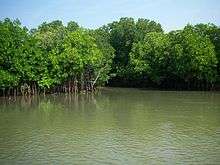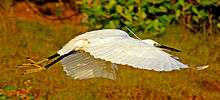Pichavaram

Pichavaram (Tamil: பிச்சாவரம்) is located near Chidambaram in Cuddalore District, Tamil Nadu, in South India. The nearest railway station is Chidambaram from where it is accessible by road. The Pichavaram Mangrove Forest near Chidambaram, South India, by the Bay of Bengal is the world's second largest mangrove forest.[1]
Pichavaram mangrove forest is located between two prominent estuaries, the Vellar estuary in the north and Coleroon estuary in the south. The Vellar - Coleroon estuarine complex forms the Killai backwater and Pichavaram mangroves.The backwaters, interconnected by the Vellar and Coleroon river systems, offer abundant scope for water sports such as rowing, kayaking and canoeing. The Pichavaram forest not only offers waterscape and backwater cruises, but also another very rare sight - the mangrove forest trees are permanently rooted in a few feet of water. There are more than 400 water routes available for boating.
Mangrove Forest


Pichavaram (MadBoon) has a well-developed mangrove forest. Pichavaram consists of a number of islands interspersing a vast expanse of water covered with green trees. The area is about 1100 Hectare and is separated from the sea by a sand bar.
The Pichavaram mangrove[2] biotope, consisting of rare species like Avicennia and Rhizophora presents a special attraction, with its peculiar topography and environmental condition. It supports the existence of many rare varieties of economically important shell and finfishes.
The Pichavaram mangroves attract an appreciable bird population of residents, local migrants and true migrants. Amongst others, one can view birds like snipes, cormorants, egrets, storks, herons, spoonbills and pelicans. At the mangroves, so far, 177 species of birds belonging to 15 orders and 41 families have been recorded. The season for birds is from September to April every year. Peak population of birds could be seen from November to January. This is due to high productive nature (in terms of prey organisms) of the ecosystem and coincidence of the time of arrival of true migrants from foreign countries and local migrants from their breeding grounds across India. The availability of different habitat types such as channels, creeks, gullies, mud flats and sand flats and adjacent sea shore offers ideal habitat for difference species of birds and animals.
Dawn Festival
In the above background, the Tamil Nadu Tourism Development Corporation and the District Administration of Cuddalore District have proposed to conduct an Eco Tourism festival namely " Dawn Fest " (Vidiyal Vizha) at Pichavaram.
Views of mangrove
-
-
-
-
-
-
-
-
-
-
-
-
-
-
-
-
-
-
-
-
-
-

View from a motor boat
-

Roof top view of Pichavaram
-

-

View from Watch Tower
-

Inside the forest
Fish and birds
-

Little egret on the fly
-

Fish jumping out of the water
-

Little egret (Egretta garzetta) on mangrove
-

Eastern great egrets (Ardea modesta) in Pichavaram waters with mangroves in the background
References
External links
| Wikimedia Commons has media related to Pichavaram. |
| ||||||||||||||||||||||||||||||||||||||||||||||||||||
